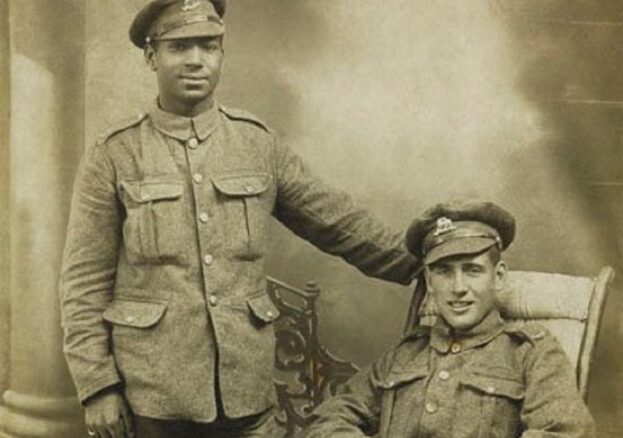
Harold would be one of three children with a brother called Gordon and a sister called Ada. After attending school in Canning Town, Harold was enlisted as a teenager into the army following the outbreak of the First World War.
He was to serve as a private with the Royal West Surrey Regiment being shipped with the west if the regiment to France in 1916, where they would fight at Arras and then in Ypres in Belgium. In 1917 at the Battle of Polygon Wood Harold’s battalion would capture a German concrete fortress resulting in the following loss of life, three officers and 61 men were killed, 17 officers and 241 men were wounded, and an additional 21 men went missing.
Due to his actions at Polygon Wood Harold was awarded a Certificate of Gallantry. The war diary for the 8th October said of Harold that he, ‘set a fine example of physical endurance carrying on throughout the whole of October 4th although severely wounded at the outset’. A card sent to Harold from the Twenty First Division British Expeditionary Force, read ‘Your Commanding Officer and Brigade Commander have informed me that you distinguished yourself in the Field between the 2nd and 7th October 1917.
I congratulate you on your fine work’. This was not the last award for Harold, he would receive a second Divisional Certificate of Gallantry signed by Sir Henry Rawlinson, the Commander of the Fourth Army, along with the Military Medal, in December 1919. Harold would be demobilised the same year. After the war he would work as a seaman and a docker at the Royal Albert Docks in the East End of London for the remainder of his life.
As the nation’s largest Armed Forces charity, the Royal British Legion (RBL) is dedicated to ensuring that all those who served and sacrificed, and who continue to do so, in defence of our freedoms and way of life, from both Britain and the Commonwealth, are remembered.
In our acts of Remembrance, the RBL remembers,
- The sacrifice of the Armed Forces community from Britain and the Commonwealth.
- Pays tribute to the special contribution of families and of the emergency services.
- Acknowledges the innocent civilians who have lost their lives in conflict and acts of terrorism.
The story of Black British and Black African and Caribbean service and sacrifice is one that we are keen to share, a story of men and women who have done so much in defence of Britain and in protecting all our citizens. A story that is replete with stories of bravery and courage, as epitomised by Victoria Cross winner Johnson Beharry.
 Therefore, to mark 100 years since Britain’s current Remembrance traditions first came together, the RBL has bought together over 100 stories of British and Commonwealth African and Caribbean service and sacrifice. The stories range from the First World War to the present day and are of servicemen and women from across Britain, Africa and the Caribbean, representing both the armed forces and emergency services.
Therefore, to mark 100 years since Britain’s current Remembrance traditions first came together, the RBL has bought together over 100 stories of British and Commonwealth African and Caribbean service and sacrifice. The stories range from the First World War to the present day and are of servicemen and women from across Britain, Africa and the Caribbean, representing both the armed forces and emergency services.
The RBL wishes to offer special thanks to Stephen Bourne for his help in putting these stories together. Stephen Bourne has been writing Black British history books for thirty years. For Aunt Esther’s Story (1991) he received the Raymond Williams Prize for Community Publishing. His best-known books are Black Poppies (2019) and Under Fire (2020). His latest book Deep Are the Roots – Trailblazers Who Changed Black British Theatre was recently published by The History Press. For further information about Stephen and his books, go to his website www.stephenbourne.co.uk
